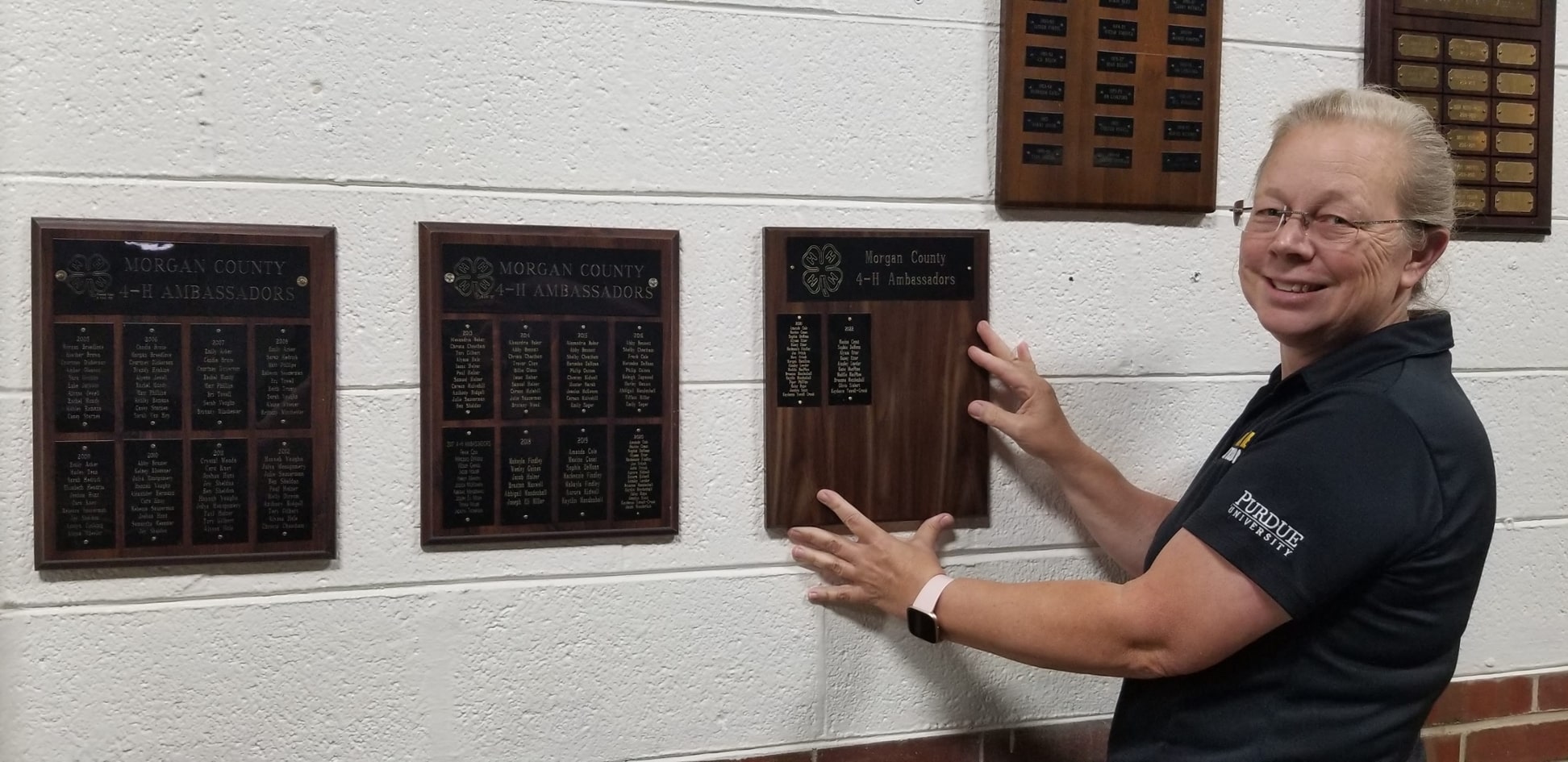33 most frequently asked questions about 4-H and 4-H clubs

Contact Purdue extension morgan county
765-342-1010
1. what is 4-H?
4-H is a volunteer-led organization that reaches boys and girls through clubs and sometimes in classrooms. 4-H members decide for themselves which projects they want to learn more about. Most projects use hands-on learning experiences to teach subject matter and life- skills such as cooperation, leadership, and decision-making. These skills can be applied over and over for a lifetime.
2. what do the h's stand for?
Head, Heart, Hands, and The 4-H Pledge --“I Pledge . . .
My head to clearer thinking My heart to greater loyalty My hands to larger service My health to better living
For my club, my community, my country, and my world. “
3. What is the 4-H Emblem?
A green four-leaf clover with a white "H" on each clover leaf.

4. why do young people like 4-h?
They have FUN with friends at meetings, social activities, tours, trips, camps, and fairs. They learn to do interesting things such as take care of animals and plants, redecorate their rooms, fix their bikes, take pictures, practice cooking, and collect rocks. And, they help others to learn more about their 4-H projects, provide leadership to younger members, as well as serve others through community service activities.
5. who can join 4-h?
4-H is for those in grades 3 – 12 of the current year. Mini 4-H is for those in grades K-2. It is open to everyone, regardless of race, religion, color, disability, gender, or place of residence.
6. How do you join?
Call or email the Morgan County Extension Office (765-342-1010 or morganCES@purdue.edu) Check with them to find out what clubs, projects, and activities are available.
7. Who provides leadership?
4-H in Indiana is sponsored by Purdue University. Nationally, it is part of the Extension Service of the U.S. Dept. of Agriculture. Local leadership is provided by 4-H Youth Educator Rena Sheldon, in the Purdue Extension-Morgan County and supported financially by county, state, and federal tax dollars.

4-h clubs
8. how do you organize a 4-h group?
Call or email the Morgan County Extension Office (765-342-1010 or MorganCES@purdue.edu) to discuss how to get started. Have a meeting with the young people who are interested and the adults who are willing to help. Publicize it through schools or any place where young people and their parents can be reached.
9. Who names a club?
The members of the club -- with guidance from their leader and 4-H Youth Specialist.
10. what happens at the first meeting?
Get acquainted and have fun with a group mixer and/or some refreshments. Show and talk about some projects the group might like. (Give this some thought in advance and invite the 4-H Youth Educator or an experienced 4-H leader.) Discuss when, where, and how often the group will meet.
11. where do 4-h clubs meet?
Any place is acceptable if it is large enough and is convenient for the members of the group. Some clubs meet in leaders’ or members’ homes. Some meet in a central location such as a community room school or church.
12. How often do 4-h clubs meet?
Some clubs meet every month year-round and others meet every week for a month or two. This depends on the needs and desires of the group. 4-H clubs organize and start the new 4-H year on October 1. 4-H members are encouraged to be enrolled by January 15 of the current 4-H year.
13. should 4-h clubs have enrollment fees/dues?
Purdue charges $15.00 annually per member for grades 3-12. There is no enrollment fee for those in grades K-2. Some clubs collect an additional amount for club activities and community service projects. Clubs may conduct fundraisers to supplement their programming needs. Dues/enrollment fees cannot be used as a barrier to keep someone from joining 4-H.
14. what about officers?
4-H clubs elect officers and whatever committees they need to conduct their business. 4-H has instructional materials available for presidents, vice-presidents, secretaries, treasurers, news reporters, recreation leaders, historians, song and game leaders. The club may have any number of officers, depending on its needs. It is a good idea to wait until the second or third meeting to elect officers so members know each other better.
15. how big should a club be?
This depends on the leader the space available for the club meetings, and the leadership available. The ideal club is big enough to have fun together but small enough for everybody to feel a part of the group.
leaders
16. what is a 4-h leader?
An adult who works voluntarily with a group of 4-H members.
17. Are there different kinds of leaders?
Yes. Some leaders teach members how to do things and are called "project leaders". They usually have a special interest or skill such as animals, photography, clothing, gardening, etc. Adults who help a group get organized and run its meetings are called "club leaders". Can the same person be a project and a club leader?
Sure -- if they have the time and interest. Sometimes big clubs divide these jobs and have several project leaders and youth leaders to meet all the interests of 4-H members.
18. who are youth leaders?
Youth leaders are older 4-H members who usually work under the direct supervision of an adult leader to assist with a project or special club activity.
19. How many leaders should a 4-H club have?
That depends on the size of the club and the ages of its members and what the volunteer feels comfortable with. Larger Clubs should have a main leader and at least 1 or more assistant leaders to share the workload and give individual attention to members.
20. where do I learn how to be a 4-h leader?
Call or email the Morgan County Extension Office (765-342-1010 or MorganCES@purdue.edu). The 4-H Youth Educator can discuss with you your interest in working with youth and your previous experience. Volunteers are asked to complete a Volunteer Application with 3 references, Adult Behavior Expectations form, and consent to a Background check. You will also be asked to have a one-on-one Volunteer Orientation with the Morgan County Youth Educator. Indiana 4-H provides safe environments for everyone involved in youth activities.
4-h Meeting
21. what happens at meetings?
Each club is different so there is no “one size fits all”. 4-H clubs usually do general kinds of things: project work, conduct business meetings, recreation or social activities, community service work, and special interest programs.
22. are all of these things done at one meeting?
Sometimes they have a little business meeting, have demonstrations, might work on a club project, then have recreation. Occasionally the whole meeting is devoted to one thing or they might elect officers and plan the club programs for the year; have a pizza-making party; tour a local business, etc. Variety is important.
23. who plans the programs for the club?
Leaders and Members of the club. This might be done at a meeting of the club, or ideas are collected and a committee puts together a program.
24. when do clubs meet and how long do they last?
This depends on the group. Many clubs meet for an hour or two after school, in the evening, or on the weekend. The most important thing is to have a regular time to get together.
4-H Projects
25. What are 4-h Projects
A 4-H project is a series of learning experiences for 4-H members. Most projects have manuals to assist the 4-H leader, parent, and member with his or her project.
26. What is a 4-h project manual?
In Morgan County, we have Project Manuals and a Project Handbook (both available for purchase in the Extension Office). A project manual contains the help and direction needed to complete the project. Some projects have a manual for each division. Others have one manual which is used for several years. Project Handbook gives the information for the project to be completed and exhibited and the County and/or State Fair.
27. what does a 4-h project cost?
It varies. A member enrolled in crafts might use supplies from around the home to practice the skills he or she is learning and have no additional expense. A member who buys and keeps a horse might invest hundreds of dollars. Members should consider cost as they select a project. It should be realistic to the family situation.
28. Are 4-h members expected to do their own project work?
Yes. 4-H is a "learn by doing" program. Leaders, youth leaders, and parents may tell or show a member how, but members are expected to learn to do things themselves. One of the principles of 4-H is that allowing youth to learn and do builds self-worth.
29. are projects done individually or as a club?
Depends. Some clubs will do a project as a group. For example projects like Sportfishing, Geology, or Biking are more fun when done as a group. Sewing, posters, and foods are more individual work.
30. what is an exhibit?
An exhibit is an object or display designed to help a member show what he or she has accomplished. Ideally, it motivates youth to learn and to have fun in a 4-H project. An exhibit is not an end in itself, nor does it measure all the learning that takes place from completing a project. Projects are judged and displayed at local, county, and state fairs.
4-h parents
31. what should parents know about 4-h leaders?
It is important to understand that leaders are volunteers who are not being paid. Parents should attend 4-H meetings or volunteer to help with a meeting or activity so they can see how leaders work with the club members.
32. How do you get parents to help?
Ask them. Be specific about jobs the club needs help with. Think positively. People who ask for help usually get it. Offer a choice of jobs as parents can provide different amounts of time and abilities. Ask the young people to ask their parents to help.
33. as a 4-h parent, how can I help my child?
Counsel your child in the selection of 4-H projects that are interesting and can be conveniently financed. Continue to show interest and enthusiasm after the projects have been selected. Help your child understand what to do, when to do it, and how to carry out the various phases of the project. Assist your son or daughter with project work, but don't do the project for him or her. Your job is to teach, not govern; to guide, not control. Learn to give increased freedom as your child’s skills develop.
websites of interest
Indiana 4-H, Purdue University 4-H/Youth Development

Enroll in 4-H
